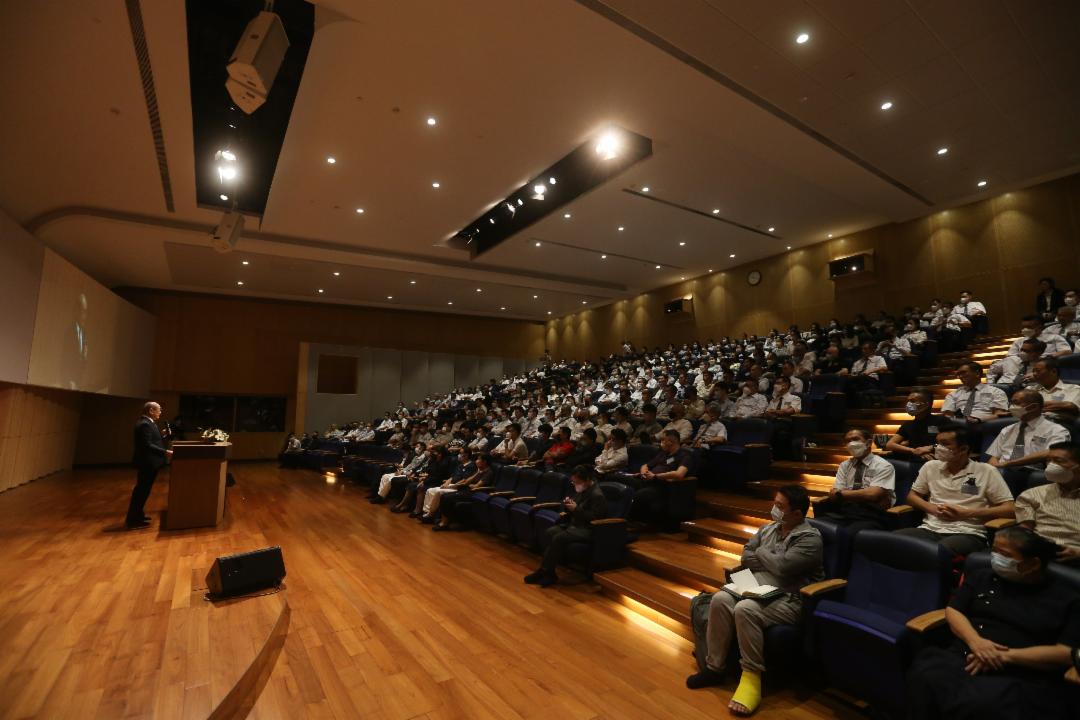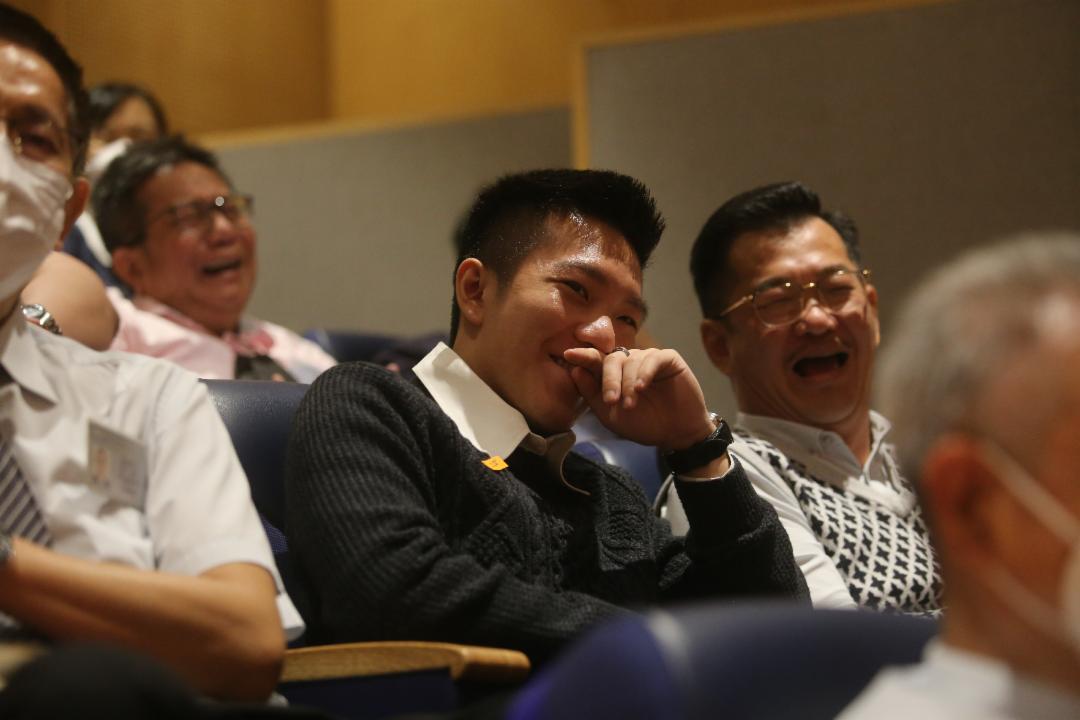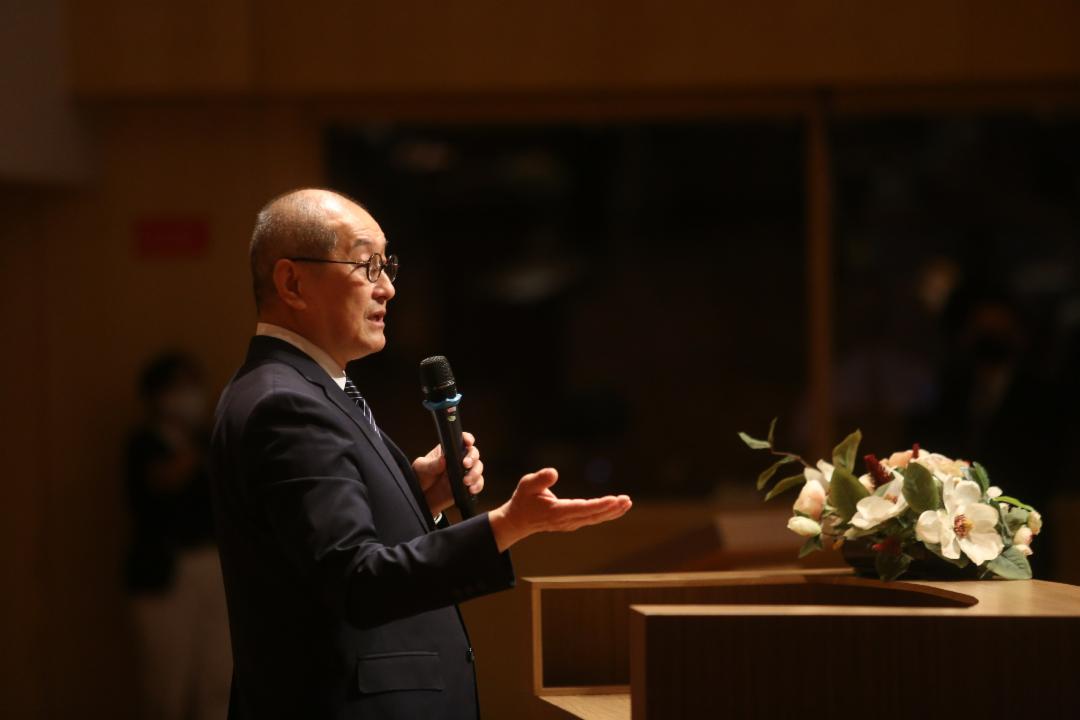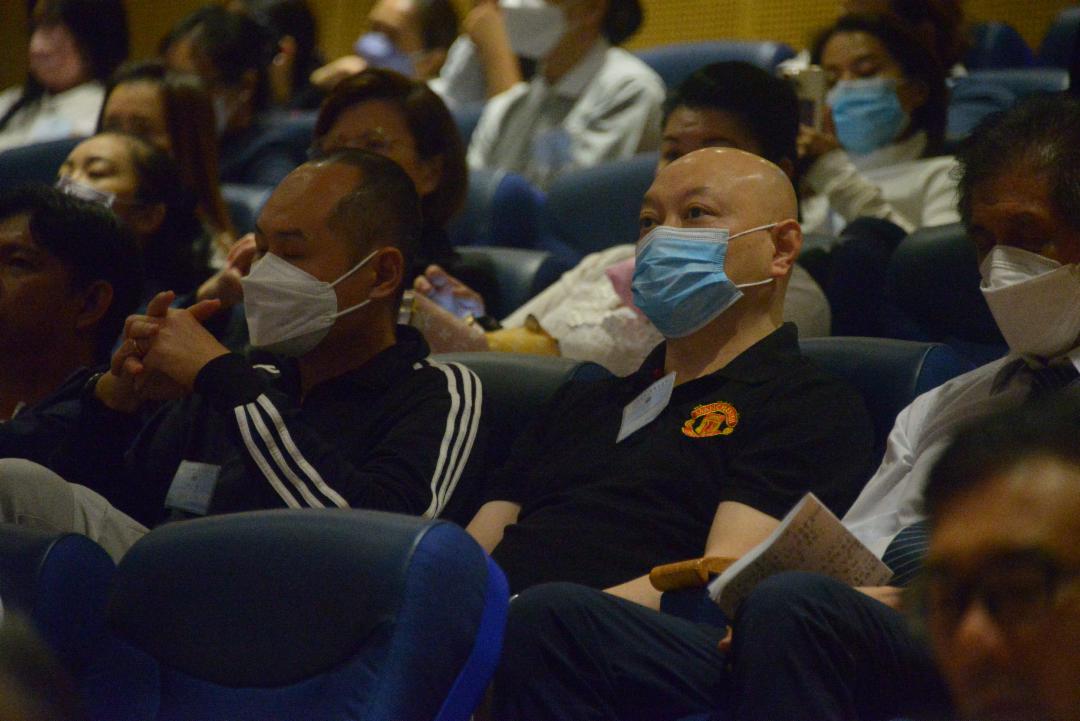He joined Tzu Chi in 1993, and in 2001, he decided to cease his business and donate his factory to Tzu Chi for the construction of the Malacca Jing Si Hall. His graceful exit from the business world reflects his attitude towards money. After retiring, he did not indulge in travelling or leisurely pursuits with his savings. Instead, he opted to utilise his funds for various international disaster relief efforts or public speaking engagements, reflecting the essence behind the topic of his speech that, “Knowing How to Earn Is a Novice, Knowing How to Spend Is a Master.”
The 2023 Entrepreneurs’ Exchange and Learning Camp took place on March 11 and 12, at KL Tzu-Chi Jing Si Hall. Some 200 entrepreneurs attended the event in order to gain some insights into Tzu Chi’s philosophies, collect positive vibes, and blend these into their businesses and daily lives. The aim is to become the “wealthy among the rich.”
On the first day of the camp, Tzu Chi volunteer David Liu, known for his ability to engage his audience with humour and convey deep philosophies through small stories, delivered a talk on the topic, “Knowing How to Earn Is a Novice, Knowing How to Spend Is a Master.” He enlightened the audience on the greater significance of wealth utilisation over mere wealth accumulation.

◎ Surviving two crises
David Liu and his wife, Echo Chien, came from Taiwan to Malacca in 1988 to start a garment manufacturing business. Over the course of 13 years in business, they faced two economic crises. It dawned on him that while one can make small fortunes through one’s own efforts, great fortunes can only be bestowed. He navigated safely past several major business obstacles and attribute this to the guidance of Master Cheng Yen and the protection of Guan Yin Bodhisattva.
He recalled that back in 1996, the Malaysian economy was booming with the construction industry taking the lead. A Taiwanese businessman invited him to form a joint venture to start a brick factory. Although the production costs were low and the profits were high, David Liu was unsure and decided to travel to Taiwan to seek Master Cheng Yen’s advice. The Master pointed out that starting such a business would involve damage to forests and the environment, which are not wholesome karma. Hence, it was best for him not to pursue the venture.
The following year, Malaysia was hit hard by the Asian financial crisis. Housing developers were unable to secure loans for construction projects, while the people were unable to obtain loans to buy properties. As a result, construction activities plunged. Red bricks became useless and the machines became scrap metal devoid of any value. What once seemed like a lucrative business had turned into a dead-end venture. David Liu was grateful for the Master’s advice, which helped him avoid the disastrous consequences of the sudden economic downturn.
On another occasion, his garment factory had accepted too many orders and was unable to deliver goods on time. There was so much stress and tension that every time he arrived at the factory, he felt like walking into hell. Out of desperation, he prayed to Guan Yin Bodhisattva for help and promised that if any profits could be made, these would be donated to Tzu Chi to establish a medical station for Ethiopian refugees.
Shortly thereafter, something incredible happened—the European client agreed to a postponement of the delivery without stating any deadline or demanding any compensation. This delivery was finally ready on around August or September of 1997, by which time the exchange rate between the Malaysian Ringgit and the US Dollar had increased from 2.5 to 3.8. David Liu’s profits had unexpectedly multiplied, and he fulfilled his vow to donate the proceeds to Tzu Chi. This incident led him to reflect that “great fortunes can only be bestowed.”
◎ Relax, contribute, and let go
David Liu also shared several other meaningful stories.
A wealthy businessman was diagnosed with a terminal illness and the doctors were powerless to help him. Refusing to accept that he had never enjoyed life with his hard-earned wealth, he sought out a reclusive old doctor in the deep mountains.
The old doctor gave him three prescriptions, each to be taken for a straight 21 days. The first was to sunbathe on the beach daily for half an hour. The wealthy businessman relished this so much that he ended up spending two hours in the sun instead and felt incredibly happy both physically and mentally. After 21 days, he received the second prescription, which was to go to a shallow beach as the tides ebb and release five stranded marine lives into the sea. Being able to save lives and acting out of kindness filled him with immense satisfaction. Another 21 days later, he was given the third prescription, which required him to inscribe all of his negative emotions, his discontents, complaints, and worries, all on the beach using twigs. As the waves came in and washed away the words he had written, he experienced a sudden sense of joy and insight. He realised that life could be lived so happily and with ease, but he had put himself through so much agony. He was responsible for his own pain.
David Liu explained that sunbathing on the beach for half an hour daily implies learning to relax our bodies and minds and ease the stress in our busy schedules. Releasing stranded marine lives into the sea means going among people and offering help to others. Letting the waves wash away the troubles written on the beach teaches us to let go of our attachments. In essence, the story conveys the need for relaxation, contribution, and detachment in life.
He reminded the attending entrepreneurs that it is fine to have a busy life, but it is important to have direction, goals, priorities, and meaning. While one can be physically busy, the mind must not be blinded; while one can be physically tired, the mind must not be exhausted; and while one may be physically sick, the mind must not be ill.
◎ Staying calm
The second story shared was about an aircraft with a pilot, five passengers and four parachutes. Shortly after the pilot announced a malfunction of the aircraft, he jumped out of the plane with a parachute. Then, a lawyer hurriedly followed suit. The third person, a businessman, was quick to grab the third parachute and jumped off. By then, only an old man and a young boy were left behind. With only one parachute left, the old man, who felt he had little left to live for, gave the boy the chance to escape. However, the boy said that there were still two parachutes left. The old man was confused and asked how this could be as three persons had already jumped off. The boy replied, “I saw the lawyer hurriedly jumped off the plane with my backpack instead.” The crowd burst into laughter and applause.
David Liu highlighted that mistakes often happen when we are too busy. While we may be surrounded by people, we have to keep our minds calm. He advised everyone to have direction, goals, and meaningful purposes when building their businesses, and this requires wisdom to achieve.
Listening to David Liu’s sharing is always enjoyable; he never runs out of amusing stories. In another story, an elderly lady was reciting the Buddha’s name when her grandson interrupted her, demanding an ice cream. The grandmother replied, “I am in the middle of recitation, do not disturb me!” Seeing that the ice cream peddler will be leaving soon for another house, the grandson grew agitated and shouted to his grandmother, “Grandma, please pause for a while! The Buddha will not run away, but the ice cream peddler will!” The audience roared with laughter. David Liu then asked them if the boy’s words made sense, and indeed they did! The grandmother’s recitation was obviously not giving her much calm because her mind was distracted by her grandson’s fussing. It would have been wiser to have paused, bought her grandson the ice cream first and then continue with her recitation.

◎ Adaptability and flexibility are keys
In light of the economic impact of the Covid-19 pandemic over the past three years, David Liu emphasised the importance of adaptability and flexibility in order for businesses to survive such unexpected adversities. These qualities are also essential to our daily lives.
The pandemic tested our adaptability and survival skills, with those who were able to adapt and persevere having a better chance of survival. Alongside strategies and measures to deal with challenges, one’s blessings also play an important role. Without sufficient blessings accumulated through kindness and good deeds, our careers may not progress smoothly, our marriages may lack bliss, and our lives may not be as smooth. A lack of blessing suggests a shortfall in positive affinities, which may lead to a lack of benefactors in our lives.
What is flexibility? It refers to the ability to adjust ourselves during the adaptation process. David Liu gave an example: Tzu Chi Taiwan no longer holds its entrepreneurs’ camps at Jing Si Hall, but instead holds them at a resort where entrepreneurs can relax their bodies and minds. They can enjoy the fresh morning air and various facilities and even bring their families along. Additionally, some talks are arranged to enable the attendees’ families to attend together. The entire programme is relaxed and comfortable, allowing them to take a break from their busy lives and rejuvenate.
David Liu joined Tzu Chi in 1993, and in 2001, he decided to cease his business and donate his factory to Tzu Chi for the construction of the Malacca Jing Si Hall. His graceful exit from the business world reflects his attitude towards money. After retiring, he did not indulge in travelling or leisurely pursuits with his savings. Instead, he opted to utilise his funds for various international disaster relief efforts or public speaking engagements, reflecting the essence behind the topic of his speech that, “Knowing How to Earn Is a Novice, Knowing How to Spend Is a Master.”
According to David Liu, the biggest change in those who join Tzu Chi as volunteers is in their temper. Habitual tendencies, on the other hand, are harder to change, as these are ingrained and acquired over years and possibly since childhood. If we do not change our temper, we may hurt others with our words, straining relationships with others. Walking on the Bodhisattva Path, we must cultivate a still and stable mind even when amidst a crowd. This is even more important when running a business.

◎ Give, and sow blessings for ourselves
Tan Yoke Cheng, a loyal fan of David Liu, was thrilled to finally meet him in person at the camp. She found the messages in his talk most beneficial and realised that we need to sow and accumulate our own blessings through good deeds, helping others, and contributing where possible. She believes that while with effort and strong willpower, little fortunes will come, great fortune is not something that can be sought after. She added, “Health, being at ease, and spiritually fulfilled, are also forms of wealth. When we continuously give and help others, we are also indirectly accumulating blessings for ourselves, and ultimately, we benefit the most because we will have less worries and experience greater happiness.”
Yoke Cheng’s takeaway from the speech was that, “We sow our own blessings, so we must do more good. Whenever there is an activity, participate in it, and whenever there is an opportunity to give, try to seize it.”
Lawrence Chang immigrated to San Diego, United States a decade ago, and is currently a Tzu Chi volunteer in the area. He happened to be in Malaysia for some matters and learned about the camp from his friend, so he took the opportunity to attend.
David Liu’s statements that “while one can make small fortunes through one’s own efforts, great fortunes can only be bestowed” and that “the more we do good, the greater our blessings will be,” resonated deeply with Lawrence. He shared, “Even when I was not financially well-off in the past, I always enjoyed doing good deeds. I contributed money and offered help where I could. I have come to the realisation that I have been sowing blessings and forming positive relationships all along. Whenever I need help from friends, they are always willing to lend a hand without expecting anything in return.”
After joining Tzu Chi, Lawrence no longer focuses solely on making money and building his career. He leads by example and encourages his children to participate in Tzu Chi activities. He said, “I hope my children will witness my charitable deeds and follow in my footsteps, so they will be on the right path when they grow up.”


●
Without giving, there can be no receiving. It is hoped that the entrepreneurs can gain insights into the wisdom of giving and receiving, thereby willing to contribute their time to volunteer with Tzu Chi and offer financial assistance to those in need, filling this world with a flowing cycle of selfless love!


![On the first day of the Entrepreneurs’ Exchange and Learning Camp, volunteer David Liu gave a presentation entitled, “Knowing How to Earn Is a Novice, Knowing How to Spend Is a Master,” sharing with the entrepreneurs the importance of using money wisely apart from earning money. [Photo by Ch’ng Kooi Tick] On the first day of the Entrepreneurs’ Exchange and Learning Camp, volunteer David Liu gave a presentation entitled, “Knowing How to Earn Is a Novice, Knowing How to Spend Is a Master,” sharing with the entrepreneurs the importance of using money wisely apart from earning money. [Photo by Ch’ng Kooi Tick]](/images/Articles/RW/2023/KL20230311_zgh02_077.jpg)
